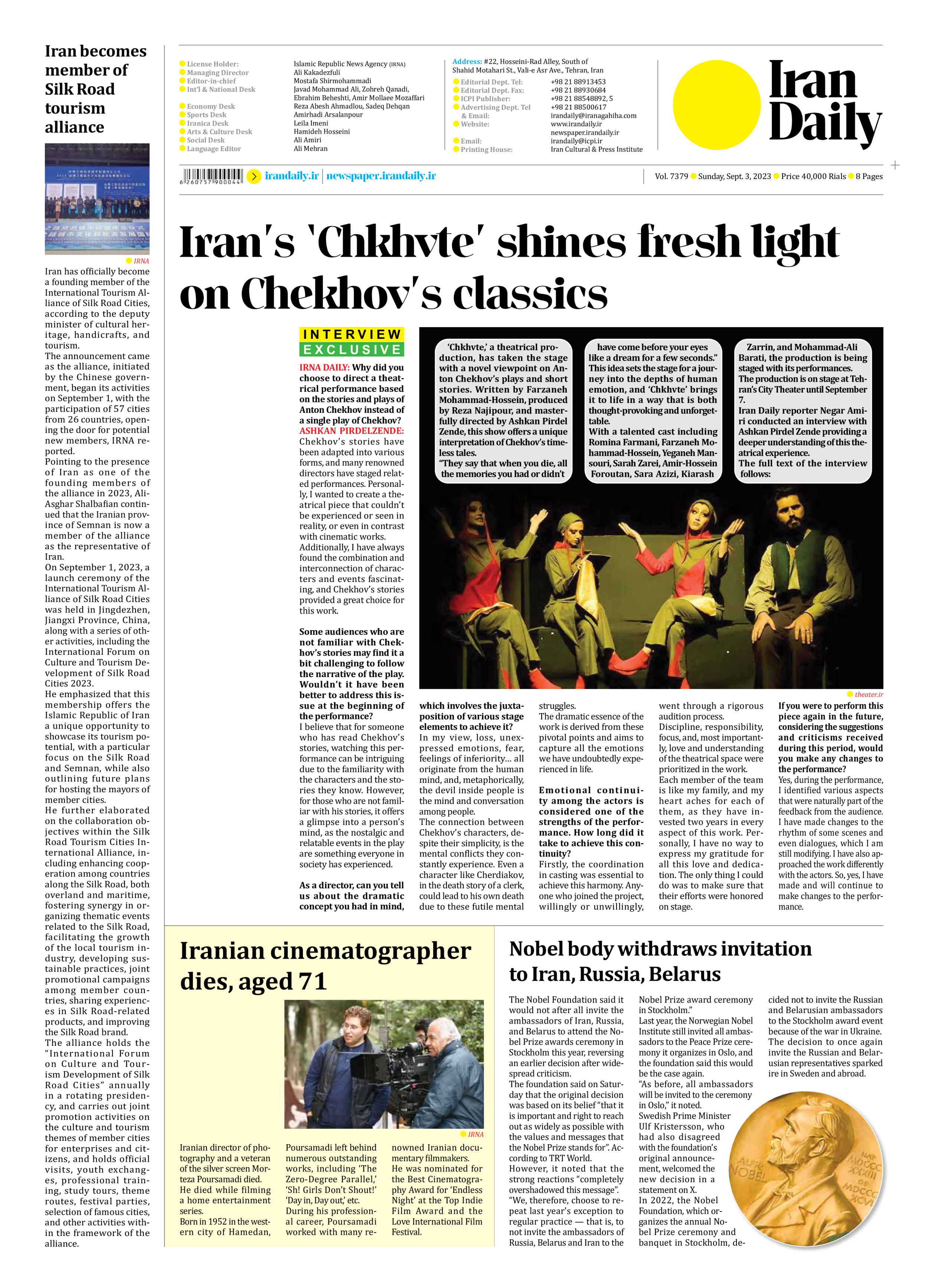
Iran’s ‘Chkhvte’ shines fresh light on Chekhov’s classics
INTERVIEW
EXCLUSIVE
IRNA DAILY: Why did you choose to direct a theatrical performance based on the stories and plays of Anton Chekhov instead of a single play of Chekhov?
Ashkan PirdelZende: Chekhov’s stories have been adapted into various forms, and many renowned directors have staged related performances. Personally, I wanted to create a theatrical piece that couldn’t be experienced or seen in reality, or even in contrast with cinematic works.
Additionally, I have always found the combination and interconnection of characters and events fascinating, and Chekhov’s stories provided a great choice for this work.
Some audiences who are not familiar with Chekhov’s stories may find it a bit challenging to follow the narrative of the play. Wouldn’t it have been better to address this issue at the beginning of the performance?
I believe that for someone who has read Chekhov’s stories, watching this performance can be intriguing due to the familiarity with the characters and the stories they know. However, for those who are not familiar with his stories, it offers a glimpse into a person’s mind, as the nostalgic and relatable events in the play are something everyone in society has experienced.
As a director, can you tell us about the dramatic concept you had in mind, which involves the juxtaposition of various stage elements to achieve it?
In my view, loss, unexpressed emotions, fear, feelings of inferiority… all originate from the human mind, and, metaphorically, the devil inside people is the mind and conversation among people.
The connection between Chekhov’s characters, despite their simplicity, is the mental conflicts they constantly experience. Even a character like Cherdiakov, in the death story of a clerk, could lead to his own death due to these futile mental struggles.
The dramatic essence of the work is derived from these pivotal points and aims to capture all the emotions we have undoubtedly experienced in life.
Emotional continuity among the actors is considered one of the strengths of the performance. How long did it take to achieve this continuity?
Firstly, the coordination in casting was essential to achieve this harmony. Anyone who joined the project, willingly or unwillingly, went through a rigorous audition process.
Discipline, responsibility, focus, and, most importantly, love and understanding of the theatrical space were prioritized in the work.
Each member of the team is like my family, and my heart aches for each of them, as they have invested two years in every aspect of this work. Personally, I have no way to express my gratitude for all this love and dedication. The only thing I could do was to make sure that their efforts were honored
on stage.
If you were to perform this piece again in the future, considering the suggestions and criticisms received during this period, would you make any changes to the performance?
Yes, during the performance, I identified various aspects that were naturally part of the feedback from the audience. I have made changes to the rhythm of some scenes and even dialogues, which I am still modifying. I have also approached the work differently with the actors. So, yes, I have made and will continue to make changes to the performance.
‘Chkhvte,’ a theatrical production, has taken the stage with a novel viewpoint on Anton Chekhov’s plays and short stories. Written by Farzaneh Mohammad-Hossein, produced by Reza Najipour, and masterfully directed by Ashkan Pirdel Zende, this show offers a unique interpretation of Chekhov’s timeless tales.
“They say that when you die, all the memories you had or didn’t have come before your eyes like a dream for a few seconds.” This idea sets the stage for a journey into the depths of human emotion, and ‘Chkhvte’ brings it to life in a way that is both thought-provoking and unforgettable.
With a talented cast including Romina Farmani, Farzaneh Mohammad-Hossein, Yeganeh Mansouri, Sarah Zarei, Amir-Hossein Foroutan, Sara Azizi, Kiarash Zarrin, and Mohammad-Ali Barati, the production is being staged with its performances.
The production is on stage at Tehran’s City Theater until September 7.
Iran Daily reporter Negar Amiri conducted an interview with Ashkan Pirdel Zende providing a deeper understanding of this theatrical experience.
The full text of the interview
follows:







